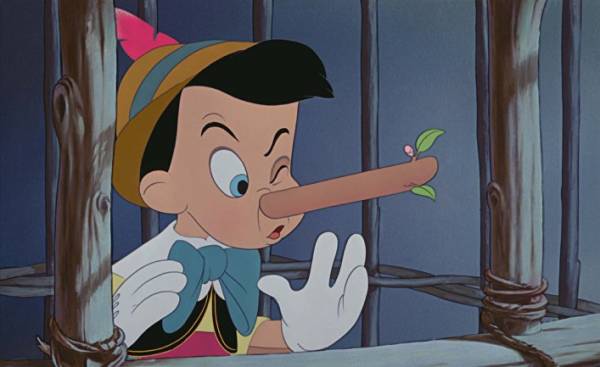
The audience was Packed. Almost 900 boys and girls aged nine to twelve years crowded where students usually sit. It is a University for children at the University of Hamburg, where the theme of the psychologist Nina Kruger (Nina Krüger) aroused great interest. “Who of you today has already lied?” she asks. Timidly raised hands. Only the parents sitting on the back row, not stirred no hand. Adults for security purposes, did not consider themselves to respondents, because nobody likes to admit a lie.
Lying is considered unseemly: “murder will out”, or, as they say, “once lied forever liar became.” Selfish lies destroys trust and can jeopardize the partnership.
White, black and blue lies
But a little lie is part of everyday life: nearly every day we are a little deceiving. There is a positive lie, which helps to avoid quarrels and conflicts, and which, on the contrary, brings more good than harm, says Kruger: “In this case, scientists speak about “white” lies.” So not true with “positive implications” for other eases joint life.
You often see this, for example, when a husband says to his wife that he likes her dress, even though he actually considers it ugly. Or when a man says that he likes the food, although it is too salty. “Such a lie can’t hurt others,” says Kruger.
“Black” lies, on the contrary, brings the liar benefits, such as providing false information in tax returns. While “blue” is a lie designed to help other people, for example, when the disciples know who painted graffiti on the white wall of the school, but not betray him.
Anyway everyone is lying. According to the data, which are often found on the Internet, up to 200 times a day, although exact confirmation of this. Twice a day sounds more realistic: to this average figure come from a team of researchers from Germany, Belgium, USA and the Netherlands. Were surveyed more than a thousand people in Amsterdam about how often they lied last night — was asked to give an “honest answer”.
The study “From Junior to senior Pinocchio”, which last year received the award for a curious study, studied the question of at what age a lie is most often used. “The result of our study was the conclusion that children and older people lie less and exert more effort than younger adults,” explains participating in the work of psychologist at the University of würzburg Christina Sukhotsky (Kristina Suchotzki).
Lie harder truth
Explanation: a lie requires complex behavior. Whoever answers the question first, think about the truth. In order to lie, you have to hold back the truth and develop the most likely alternative. According to the study, the children are not very good at. To old age this ability is probably weakened again, at least this was the result of research in the Netherlands.
In Germany, the Agency myMarktforschung in 2016 published the results of a survey among 1024 participants. Then almost 60% of Germans admitted that they tell lies daily, at least once, mostly from noble reasons. 49% is lying in order to cheer up others or to please them, 40% feign zeal and interest, 37% lie to comfort others.
In the “black” and, therefore, self-serving lies admits far fewer people. Only 22% of respondents said that using data were given about achievements of others as their own, or lied when applying for a job, exaggerating their skills.
Ban lie
The fact that such selfish lies are unacceptable, written in the Scriptures. “Do not bear false witness against thy neighbor”, so the sound of the eighth commandment in the Bible, which is universally interpreted as “prohibition lies.”
In his consulting practice psychologist and theologian Edwin yabs (Edwin Jabs) is increasingly common that people don’t take the truth seriously. “It’s a classic case of the emergence of the marriage relationship on the side,” — said the head of the Evangelical counseling center family and life in düsseldorf. “Together with the seekers of the Council, we discuss what it means when they tell the truth,” says jabs.
Ultimately, this decision of conscience. And yet he offers to ponder what lies can destroy trust between couples.
In the children’s University at the end of the lecture Nina Krueger asked what the parents lied they are today. And then some absolutely honestly in “necessary lies” that turned out to be a revelation for many children, which was accompanied by laughter and applause.







